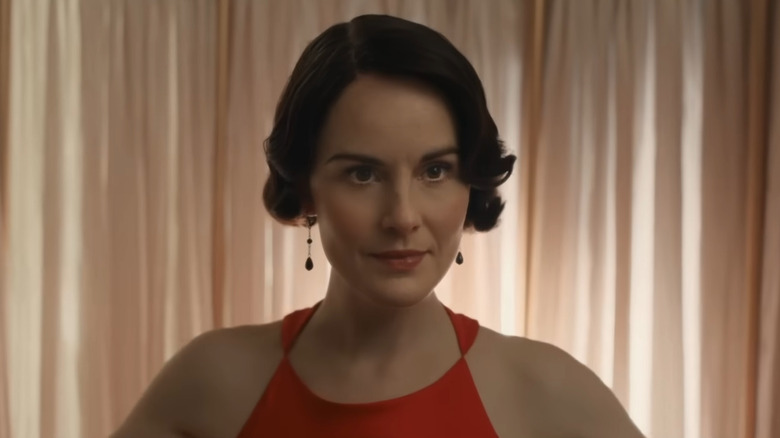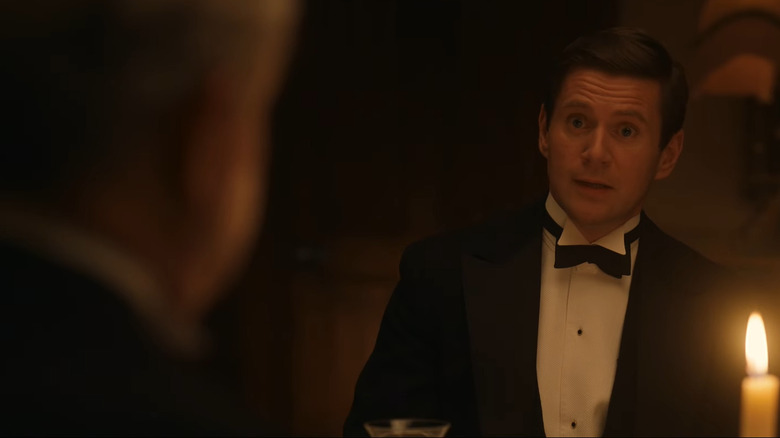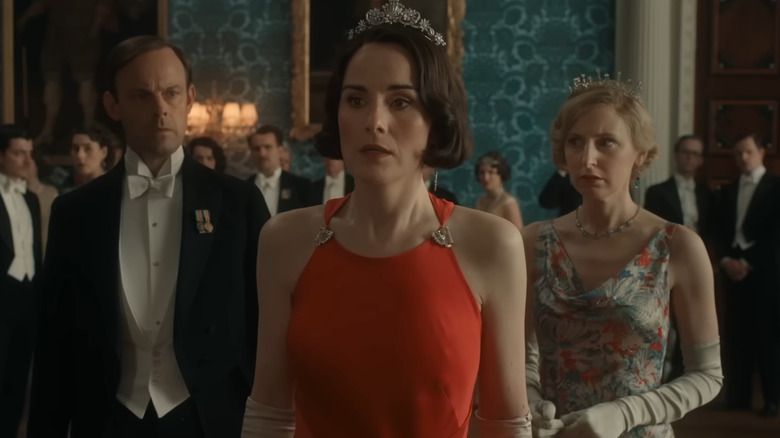The Biggest Problem With Downton Abbey: The Grand Finale Won't Surprise Fans
This article contains spoilers for "Downton Abbey: The Grand Finale."
After six series, five Christmas specials and two feature films, "Downton Abbey: The Grand Finale" has finally brought the opulent ITV period melodrama to a close — and what a journey it's been. I first discovered the show back when it was already a few series deep into its run on PBS' Masterpiece Theater in the US. It was all too easy to be drawn in by its soap opera plotlines and stacked ensemble of British talent, whose charm often went a long way. You can walk into the movies without having seen the series and, while you may miss some context clues, everyone's so proficient at embodying their roles that you can follow along quite easily. "Downton Abbey" has taken me to some exciting places in my career, having been able to interview the lovely cast and crew whilst in the English countryside.
The sun has set on Highclere Castle many times now, but the title of this third film gives the indication that series creator-writer Julian Fellowes is ready to let the Crawleys go. By all accounts, "The Grand Finale" is an ending that will leave the most loyal "Downton Abbey" devotees feeling satisfied in being able to spend just a few more hours with the characters they had grown accustomed to love over the past decade or so. It pains me to say, however, that it's also the weakest film in the franchise and a pretty underwhelming conclusion that left me frustrated in how it doesn't build upon its promise of progress in any meaningful ways.
The threequel is not all that grand when compared to the glossy Michael Engler-directed event film from 2019, nor Simon Curtis' summertime-set sequel. Its glitziest visuals are relegated for the film's opening title sequence through the hustle and bustle of downtown London nightlife. "The Grand Finale" is shot with less vigor than an episode of the show, despite Curtis returning to the director's chair. But the biggest issue with the Crawley's curtain call lies in its superficial approach to change. The seemingly conclusive "Downton Abbey" feature continuing to embrace its faux nostalgic glow is made even more disappointing when you consider there are hints of a much braver movie in there somewhere.
The last scene of "Downton Abbey: The Motion Picture" sees Mr. Carson (Jim Carter) waxing on about how the Crawleys have — and will continue to — run the estate, only for Mrs. Hughes (Phyllis Logan) to follow it up with "we'll see." It gives the indication that, for as great as it is to see the upstairs and downstairs crew back in their familial element, change will pay no mind to the traditions of Downton. The aristocratic Crawleys and their ownership of the centuries-old manor cannot stop the rising tide of history. So how will they respond?
Downton Abbey: The Grand Finale predictably refuses to evolve
While the television show is no doubt a romanticized fantasy of a bygone era, it wasn't allergic to exploring the horrors of war, women's rights and criminalized Queerness. Fellowes' restraint to make his characters reflect the nastier side of British hierarchical structures found within his Academy Award-winning screenplay for "Gosford Park" prevented the Crawleys from becoming too unlikeable. It's how he's always written them. But this decision hampers the potential of "The Grand Finale" to evolve beyond the show's limited perspective.
The two main sources of tension in this film derive from the Crawleys grappling with whether to sell Downton in order to pay off their debts, and Lady Mary becoming a source of controversy for getting a divorce from her second husband Henry Talbot (a noticeably absent Matthew Goode). Each is rife with the opportunity to put this family, who is often assured the comfort of luxury, to bear the brunt of a world that doesn't need them in their current state. "Downton Abbey" tended to stop short of any radical acceptances of new norms, yet it feels egregious here.
The Crawley's money problems are all placed unto one individual in the form of American financial advisor Gus Sambrook (Alessandro Nivola). It was a nice surprise to see him take part, and an even greater surprise to see him help Lady Mary loosen up. The aftermath of some drinks and frisky playtime reveal a snake who is more than willing to tarnish Last Mary's reputation that much more in order to get what he wants. Gus doesn't get to be much of a villain, however, because his identity, motives and rather easy takedown from Lady Edith (Laura Carmichael) occur within the space of a five minute scene that still leaves over a half hour left in the film.
The driving force of "Downton Abbey" occurs in the show's very first episode when the Crawleys learn of tragedy. News travels fast that the familial suitor Lady Mary (Michelle Dockery) was set to marry drowned with the Titanic. It's a sudden and unexpected turn of events that throws the family's security in the estate into disarray. The inciting incident echoes an idea that keeps popping up throughout the series of change being all but inevitable. "Are we right to keep it all going when the world it was built for is fading with every day that passes," a shaken Lady Mary asks the Countess of Grantham (the late Dame Maggie Smith) at the end of "The Motion Picture." There's even an interesting moment in "The Grand Finale" when Tom Branson (Allen Leech) tells the Earl of Grantham (Hugh Bonneville) that "the system doesn't work if people hold on too long." Those words herald progress, but in "Downton Abbey" fashion, it can't have the aristocrats lose too much of what they have, nor question the viability of their relationships with the staff.
Downton Abbey: The Grand Finale is the series' biggest missed opportunity
"Downton Abbey" is as truthful to actual class dynamics as "The Conjuring" series is to what actually happened with the Warrens. It's all a fantasy. But patching up the leaky spots of the Crawley's privileged dam breaking calls into question the superfluousness of this being the closing chapter. It doesn't even feel like much of a finale, so much as yet another open ending. I also can't help but reflect on one of the many endings where a visiting Thomas Barrow (Robert James-Collier) is invited upstairs for drinks with the Crawleys in a non-servitude manner, much to everyone's shock. It wants to come across as a big gesture for the scheming footman turned playwright assistant, but if anything, it knocks him back a peg. In the world of "Downton Abbey," being invited to mingle among the rich folks without actually speaking to them is the highest honor Thomas can receive. Treating him as an equal still carries a stigmatization that feels weird in the wake of Mary's public ostracization.
The breaking news of Lady Mary's divorce early on leads to her being hidden under the staircase out of sight along with her parents. It's a loaded image for "Downton Abbey" which invites an introspection on Lady Mary's part that never really pushes her to sit with the uncomfortable truths of the system that's turned against her. We only hear about the public's reaction to Lady Mary's status as a social pariah rather than seeing her witness it for herself, barring one stubborn committee chairman and some faceless press. The lesson of standing by good people, even when it's stigmatizing and unpopular, is an important one in a divided world, and one of the only resolutions in the film that actually pays off.
"Downton Abbey" has always thrown softballs and easy answers to their problems, which mostly work within the context of imminent change. This is their last go of it, I presume, so to see them take the easy route makes the whole enterprise feel superfluous and makes for a pretty boring movie. It should come as no surprise that the stories of the downstairs staff make up some of the film's best moments, as there are actual stakes with their lives. "The Grand Finale" is about as predictable as you can get for a series like this, and that's a shame.
"Downton Abbey: The Grand Finale" is now playing in theaters nationwide.


